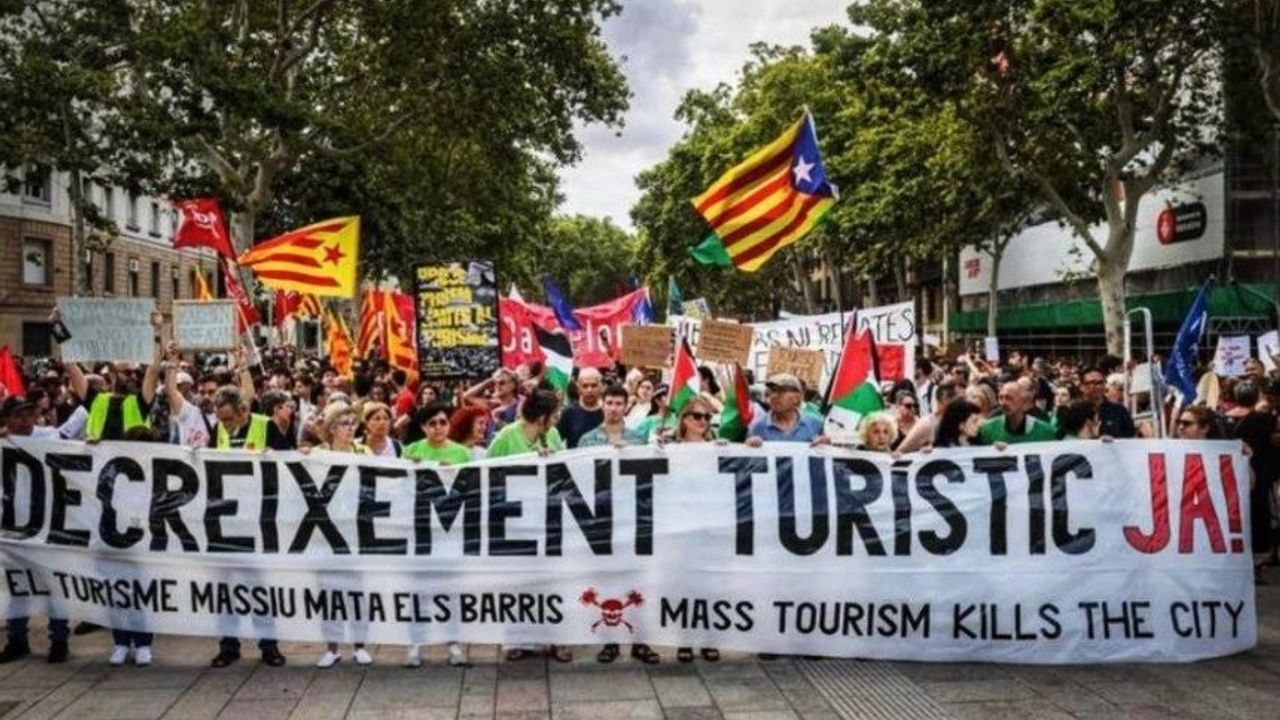In numerous European cities, local residents are reacting against excessive tourism and organizing protests. The global middle class is shifting towards Europe, which they consider more affordable. But what is the reason behind this tourism anger across the continent? The UK-based newspaper The Times analyzed the situation.
Social media's role
According to Lauterbrunnen, a Swiss village overlooking the Bernese Alps, TikTok is responsible for the surge in tourism. Selfie sticks are raised like weapons along the crowded roads of the valley, and long queues form in front of waterfalls. A drone buzzes overhead. According to local resident Alexis Heuser, the area has become overcrowded and commercialized in recent years.
This is a familiar story across Europe. Tourists, many of them Americans with strong dollars, are flocking to the continent at surprising rates: the number of American visitors to the EU is 65% higher than it was a decade ago. However, it’s not just Americans; the wealthy middle class from China, India, and Brazil is also pouring in.
Last year, the EU had 709 million overseas visitors, a 22% increase from a decade ago. As global wealth shifts from Europe to China, India, and the Gulf, the allure of Europe's beaches, museums, churches, designer stores, and deep cultural heritage has proven irresistible, especially after the pandemic restrictions were lifted.
Measures across the continent
There has been a strong reaction against excessive tourism in Europe for years. Venice has taken measures to ban cruise ships and introduced a €5 entry fee on the busiest days. Last spring, Amsterdam announced that "over-tourism" would be "completely banned" by 2035, which means no more cruise ships, new hotels, or more than 20 million hotel nights per year according to the local government. Similar anti-tourism movements exist in Athens, Lisbon, Venice, and Barcelona, as well as much of Spain, including Mallorca and Tenerife. But what is the reason behind this opposition movement? Are the protesters sabotaging themselves, or are they honest citizens trying to protect themselves?
The impact of social media tourism
The game-changer has been the emergence of cheap air travel. It's been 30 years since the EasyJet revolution, which opened Europe to all kinds of holidays. In 1955, a one-way ticket from New York to London with Trans World Airlines cost £222 or £2,561 in today's money. Now, the same journey costs around £390. Thanks to Airbnb, accommodation is often more flexible and affordable. Add to this social media tourism. With the prevalence of Instagram and TikTok, many more people are eager to visit the same places, dine in the same restaurants, or take photos at the same waterfalls.
In Lauterbrunnen, the population of 2,400 rises to 6,000 during peak season. While it’s hard to reach Venice levels, it still struggles under the burden. Some parts of the road have no sidewalks, forcing people to walk next to traffic. Signs above houses warn "caution" and "no photography." Last month, restless villagers considered introducing a "day trip tourist tax." With summer temperatures in Southern Europe regularly exceeding 40 degrees, Instagrammable Alpine valleys in Switzerland and Austria are becoming more popular. Yet there is a mismatch here. Lauterbrunnen is one of many places courting and opposing mass tourism simultaneously.
Cost of living and housing crisis
The loud anti-tourism movements in Europe have a populist tone, reflecting frustrations with the cost of living and particularly the housing crisis. Young Europeans, in particular, seem unhappy with their continent turning into a giant museum. The More Life, Less Tourism campaign group in Mallorca models itself after a similar movement in the Canary Islands, the center of Spanish anti-tourism sentiment. Pere Joan, a 25-year-old student from Mallorca, says the group increased protests this summer because the situation is no longer sustainable. Joan mentioned that they unfurled banners on the beaches targeting the occupation of the shores, surprising tourists. Although Mallorca survives thanks to tourism, Joan says wealth is unevenly distributed and does not benefit the island's residents.






